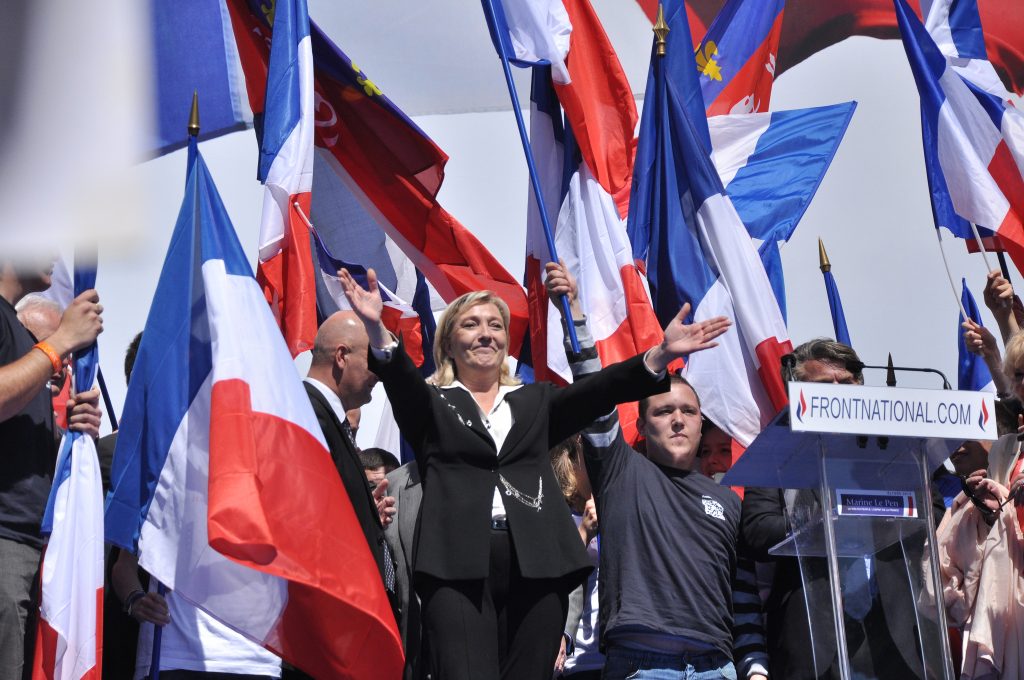Fifteen years. Three election cycles. Five million, one-hundred and thirteen thousand, four hundred and forty-three more votes.
When one compares Marine Le Pen’s 2017 electoral showing to that of her father, Jean-Marie Le Pen, in 2002, the end result—a decisive loss for the both of them—appears somewhat disheartening for the National Front and its growing number of supporters. The younger Le Pen has worked to soften the once-harsh image of the party in her six years as its president—distancing it from its anti-Semitic roots, ousting her father in late 2015, and, in her most recent electoral cycle, adopting a more feminine, maternal image in campaign posters. This approach was met with a reasonable degree of success: Dorit Geva, a EURIAS fellow studying gender politics and the National Front, told the HPR that “[Le Pen’s] gender helped her.” “The party wouldn’t have done as well as it had without her softening [its] image and [the party] capitalizing on it.”
Still, there was “never any moment where [it seemed like] Le Pen would win [the election],” Geva explained, nor “any one factor” to which one could wholly attribute the loss. Marred by the prominence of the anti-FN French populace, wavering stances on key issues, and a tragic debate performance only days before voters took to their voting boxes, Marine Le Pen’s electoral campaign was destined for failure despite the success of other nationalistic leaders and movements.
An ‘Irresistible Core’
Regardless of Le Pen’s campaigning prowess, a portion of the French population has always refused to vote for any candidate from the National Front. In the runoff, approximately 8.5% of ballots submitted were left entirely blank, and 25.4% of the eligible voting population opted to abstain. To these individuals, the choice between a politically-seasoned extremist and a sophomoric economist was one not worth making.
France’s anti-FN populace, too, has not attempted to hide from the public eye: mere days before the election, protesters engaged in numerous concerts, marches, and other public gatherings, all intended to showcase their opposition to both Le Pen and the National Front. One joint march, hosted by four different unions on May 1st, garnered nearly 40,000 participants, while May Day marches in general attracted approximately 142,000 protesters across the country.
The presence of such opposition constitutes what Arthur Goldhammer, a frequent commentator on French politics, referred to in an interview with the HPR as a “certain irresistible core”: a strong proportion of the French populace that “will not vote for the National Front” even as “the two mainstream parties [the Socialist Party and The Republicans] are falling apart and being replaced.” With limited options, there exists only “a reshuffling of the anti-FN vote that simply [falls] into different receptacles than before,” noted Goldhammer, resulting in an overwhelming victory for Macron and a resounding defeat for Le Pen.
Faux Feminism
Additionally, despite many of Le Pen’s efforts to appear more feminine and maternal in her campaign propaganda, her efforts did not extend far enough for many voters. Though Le Pen notes in her book “Against the Waves” that one may almost label her a feminist given her ability to raise children as a single mother, any identification that she holds as a feminist ends there; Le Pen has never explicitly referred to herself as a feminist, and she remains the figurehead of a party with extreme anti-abortion stances. Her attempt to represent feminism exists as nothing more than a campaign poster—particularly, one that invites voters to choisir la france (choose France) against an unusual image of Le Pen in a skirt.
Thus, while there were “some female voters who at some levels were actually sort of impressed by [Le Pen],” Geva disclosed, these same voters simply “couldn’t be won by her”—her watered-down version of feminism never quite gained enough traction in a relatively progressive country such as France.
The Immigrant Vote

French expatriates line up to vote at a polling station in Morges, Switzerland.
Even Le Pen’s pro-welfare state policies held implicit biases against immigrant men and women who, under such policies, would have been cast aside in order to prioritize French citizens. Additionally, because her immigration policies would have made obtaining French nationality more difficult, it appears that only native-born French citizens would have benefitted from the sort of aid promised by the Le Pen campaign.
With an average of 200,000 immigrants arriving in France every year, and, according to Colin Brown, a Harvard College Fellow in government and an immigration expert, “about 2.5 million immigrants [achieving] French citizenship in the last 20 years,” nearly 2.5 million out of the “47 million eligible voters” are immigrants. Alienating a population of that size is “enough to have an effect,” affirmed Brown. Even if the immigrant population does not operate as a bloc vote, “there are places across Europe where migrant-background voters have certainly influenced local elections.” Thus, while the immigrant vote certainly cannot constitute Le Pen’s ten million vote deficit, the power of 2.5 million immigrant voters cannot be understated, and Le Pen’s anti-immigration policies overwhelmingly repelled this group.
Skepticism About Euroscepticism
Le Pen’s failure to attract left-leaning voters and her strong platform of euroscepticism—consistent with the National Front’s nationalist policies—also isolated the nearly 72% of voters who want to remain on the euro.
Le Pen realized her mistake too late: just a few days before the election, she compromised her hardline, eurosceptic stance with a promise to delay the replacement of the euro. At that point, confirmed Brown, “she seemed to make her position on Europe unclear…[when] there was particular attention on her and the issue.” Not only did Le Pen’s original eurosceptic views breed overwhelming disappointment and opposition in voters, but her demonstration of uncertainty at a critical period in the campaign cycle compounded the issue by demoralizing her base.
The Debate
And then there was the debate: a catastrophe, only four days before the final round of the election, wherein Le Pen’s clear aggression disenchanted voters even more than some of her extremist policies. Seeking, at the very least, to thwart Macron’s recent polling successes, Le Pen set out to attack his credibility: labeling him as arrogant, asserting his ties to “private interests,” and referencing his former occupation as an investment banker in an attempt to showcase his ‘cynicism’ and ‘ruthlessness.’ However, such ad hominem attacks drew Le Pen’s speaking time away from what may have enticed the 16.5 million viewers the most: a careful, thoughtful discussion of both the highly salient issues and her policies.
Going into the debate, support for both Le Pen and Macron had begun to equalize—the media company SocialFlow even went so far as to suggest that the two candidates were tied in popularity, and that attempting to call the election would be “an absolute conjecture.” Yet immediately following the debate, a snap poll revealed that 63% of voters deemed Macron to be the victor—a number strangely close to the 66% of French voters that elected Macron as their new president, as well as one supported by Macron’s 20-point-lead in the polls the following day. Whatever increasing support Le Pen appeared to have before the debate, she squandered only four days before the election.
Weighing the Scales
Considering the wealth of information presented, no one factor may be identified as the sole root cause of Le Pen’s loss—an improved debate performance could not have attracted the 5.1 million more votes necessary for a Le Pen victory, just as a continued hardline eurosceptic stance would not have enticed all eurosceptics to rally behind her. Rather, a series of small, yet significant failures and shortcomings amounted to a campaign that, despite garnering far greater support than any National Front presidential campaign in history, simply could not attract a majority of the French electorate. And for Emmanuel Macron, Le Pen’s fellow presidential candidate and the ultimate victor of the 2017 French presidential election, such shortcomings were enough.
Image source: Flikr/Blandine Le Cain // Wikimedia/Rama
